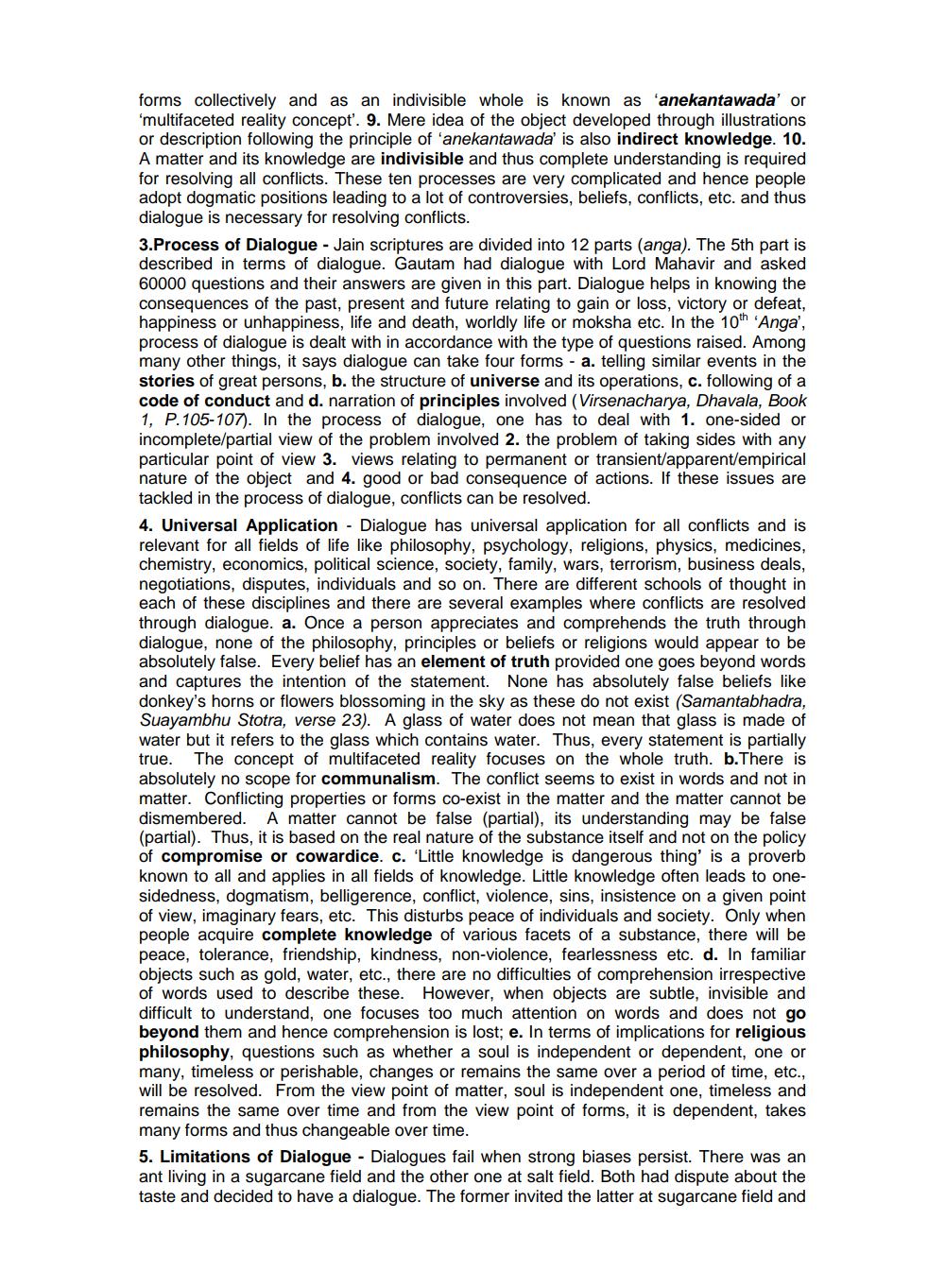________________
forms collectively and as an indivisible whole is known as 'anekantawada' or 'multifaceted reality concept'. 9. Mere idea of the object developed through illustrations or description following the principle of 'anekantawada' is also indirect knowledge. 10. A matter and its knowledge are indivisible and thus complete understanding is required for resolving all conflicts. These ten processes are very complicated and hence people adopt dogmatic positions leading to a lot of controversies, beliefs, conflicts, etc. and thus dialogue is necessary for resolving conflicts. 3.Process of Dialogue - Jain scriptures are divided into 12 parts (anga). The 5th part is described in terms of dialogue. Gautam had dialogue with Lord Mahavir and asked 60000 questions and their answers are given in this part. Dialogue helps in knowing the consequences of the past, present and future relating to gain or loss, victory or defeat, happiness or unhappiness, life and death, worldly life or moksha etc. In the 10th Anga', process of dialogue is dealt with in accordance with the type of questions raised. Amona many other things, it says dialogue can take four forms - a. telling similar events in the stories of great persons, b. the structure of universe and its operations, c. following of a code of conduct and d. narration of principles involved (Virsenacharya, Dhavala, Book 1, P. 105-107). In the process of dialogue, one has to deal with 1. one-sided or incomplete/partial view of the problem involved 2. the problem of taking sides with any particular point of view 3. views relating to permanent or transient/apparent/empirical nature of the object and 4. good or bad consequence of actions. If these issues are tackled in the process of dialogue, conflicts can be resolved. 4. Universal Application - Dialogue has universal application for all conflicts and is relevant for all fields of life like philosophy, psychology, religions, physics, medicines, chemistry, economics, political science, society, family, wars, terrorism, business deals, negotiations, disputes, individuals and so on. There are different schools of thought in each of these disciplines and there are several examples where conflicts are resolved through dialogue. a. Once a person appreciates and comprehends the truth through dialogue, none of the philosophy, principles or beliefs or religions would appear to be absolutely false. Every belief has an element of truth provided one goes beyond words and captures the intention of the statement. None has absolutely false beliefs like donkey's horns or flowers blossoming in the sky as these do not exist (Samantabhadra, Suayambhu Stotra, verse 23). A glass of water does not mean that glass is made of water but it refers to the glass which contains water. Thus, every statement is partially true. The concept of multifaceted reality focuses on the whole truth. b.There is absolutely no scope for communalism. The conflict seems to exist in words and not in matter. Conflicting properties or forms co-exist in the matter and the matter cannot be dismembered. A matter cannot be false (partial), its understanding may be false (partial). Thus, it is based on the real nature of the substance itself and not on the policy of compromise or cowardice. C. 'Little knowledge is dangerous thing' is a proverb known to all and applies in all fields of knowledge. Little knowledge often leads to onesidedness, dogmatism, belligerence, conflict, violence, sins, insistence on a given point of view, imaginary fears, etc. This disturbs peace of individuals and society. Only when people acquire complete knowledge of various facets of a substance, there will be peace, tolerance, friendship, kindness, non-violence, fearlessness etc. d. In familiar objects such as gold, water, etc., there are no difficulties of comprehension irrespective of words used to describe these. However, when objects are subtle, invisible and difficult to understand, one focuses too much attention on words and does not go beyond them and hence comprehension is lost; e. In terms of implications for religious philosophy, questions such as whether a soul is independent or dependent, one or many, timeless or perishable, changes or remains the same over a period of time, etc., will be resolved. From the view point of matter, soul is independent one, timeless and remains the same over time and from the view point of forms, it is dependent, takes many forms and thus changeable over time. 5. Limitations of Dialogue - Dialogues fail when strong biases persist. There was an ant living in a sugarcane field and the other one at salt field. Both had dispute about the taste and decided to have a dialogue. The former invited the latter at sugarcane field and




